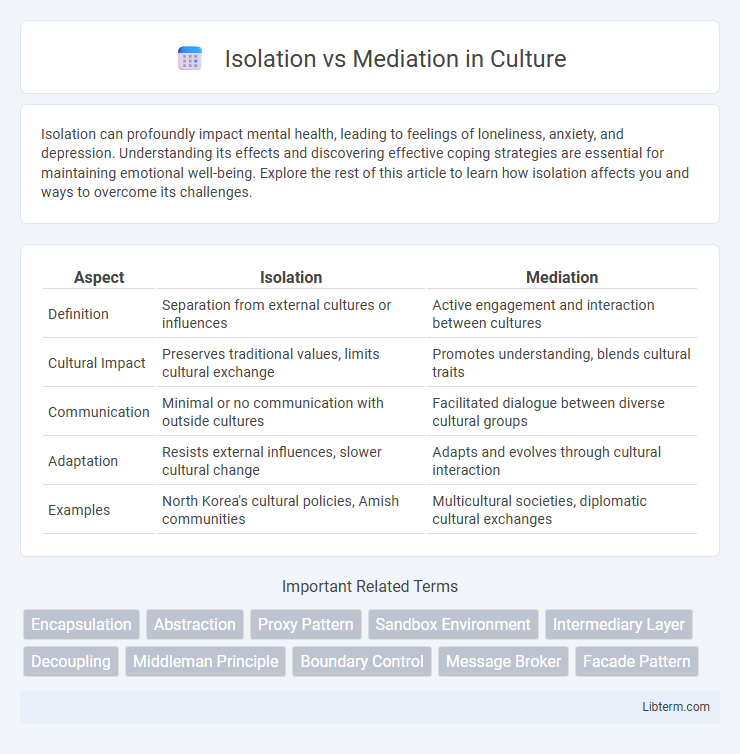Isolation can profoundly impact mental health, leading to feelings of loneliness, anxiety, and depression. Understanding its effects and discovering effective coping strategies are essential for maintaining emotional well-being. Explore the rest of this article to learn how isolation affects you and ways to overcome its challenges.
Table of Comparison
| Aspect | Isolation | Mediation |
|---|---|---|
| Definition | Separation from external cultures or influences | Active engagement and interaction between cultures |
| Cultural Impact | Preserves traditional values, limits cultural exchange | Promotes understanding, blends cultural traits |
| Communication | Minimal or no communication with outside cultures | Facilitated dialogue between diverse cultural groups |
| Adaptation | Resists external influences, slower cultural change | Adapts and evolves through cultural interaction |
| Examples | North Korea's cultural policies, Amish communities | Multicultural societies, diplomatic cultural exchanges |
Understanding Isolation and Mediation
Understanding isolation involves recognizing it as a conflict resolution method where parties avoid direct interaction to prevent escalation and maintain boundaries. Mediation, by contrast, engages an impartial third party to facilitate dialogue and help disputants reach a mutually acceptable agreement. The choice between isolation and mediation depends on the nature of the conflict, communication dynamics, and desired outcomes for resolution.
Key Differences Between Isolation and Mediation
Isolation restricts direct interaction between components, ensuring they operate independently to prevent interference and enhance modularity. Mediation involves a mediator entity that facilitates communication and coordination between components, allowing controlled interaction and collaboration. Key differences include isolation prioritizing component independence and mediation enabling managed inter-component communication for system integration.
Benefits of Isolation in Conflict Resolution
Isolation in conflict resolution minimizes direct confrontation, reducing emotional escalation and allowing parties to cool down. It provides a controlled environment for reflection, leading to clearer thinking and more rational decision-making. This approach ensures personal boundaries are respected, fostering a safer space for eventual dialogue and resolution.
Advantages of Mediation Strategies
Mediation strategies offer significant advantages by promoting open communication and fostering mutually agreeable solutions, reducing the likelihood of conflicts escalating. These techniques often save time and resources compared to prolonged isolation or legal disputes, enhancing efficiency in conflict resolution. Mediation also supports relationship preservation and encourages collaborative problem-solving, leading to more sustainable and satisfactory outcomes for all parties involved.
Isolation: Risks and Limitations
Isolation in software architecture enhances fault tolerance by containing failures within individual components, but it introduces risks such as increased latency and resource overhead due to duplicated processes. This approach limits direct communication between components, which can complicate state synchronization and cause data inconsistencies. Moreover, isolation may restrict scalability and complicate debugging efforts, as errors are harder to trace across isolated modules.
Mediation: Challenges and Considerations
Mediation involves facilitating communication between disputing parties to reach a mutually acceptable agreement, but it presents challenges such as managing power imbalances and ensuring impartiality. The mediator must navigate emotional tensions and confidentiality concerns while fostering collaboration and trust. Careful consideration of cultural differences and legal frameworks is essential to maintain neutrality and effectiveness throughout the mediation process.
When to Choose Isolation Over Mediation
Isolation is preferred over mediation when tasks require strict separation to prevent interference, such as in high-security applications or concurrent processes needing data integrity. In scenarios demanding deterministic performance and fault containment, isolation ensures that failures or issues in one component do not propagate to others, maintaining system stability. Systems with critical resources or sensitive user data benefit from isolation to minimize risks posed by shared access or indirect communication through mediators.
Psychological Impacts: Isolation vs Mediation
Isolation often leads to increased feelings of loneliness, anxiety, and depression due to the lack of social interaction and emotional support, negatively impacting mental health. Mediation, as a conflict resolution method, facilitates communication and understanding, significantly reducing psychological stress and promoting emotional well-being. Studies show that individuals engaged in mediation report lower levels of psychological distress compared to those experiencing prolonged isolation during disputes.
Case Studies: Isolation and Mediation in Practice
Case studies on isolation and mediation reveal distinct strategies in managing conflicts and improving communication. Isolation involves segregating elements or parties to prevent interference, demonstrated in competitive sports where players are isolated to minimize distractions. Mediation applies an intermediary to facilitate dialogue, as seen in workplace disputes where mediators help parties negotiate mutually beneficial outcomes.
Best Practices for Effective Mediation
Effective mediation relies on creating a neutral environment where parties feel safe to communicate openly, enabling the mediator to guide discussions towards mutually beneficial solutions. Best practices include active listening, impartiality, and fostering empathy to address underlying interests rather than positions. Maintaining confidentiality and setting clear ground rules prevent escalation, ensuring the mediation process remains productive and focused on resolution.
Isolation Infographic

 libterm.com
libterm.com